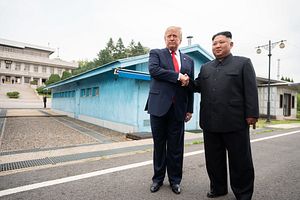After a season of “fire and fury,” U.S. President Donald J. Trump’s Singapore summit with North Korean leader Kim Jong Un in 2018 appeared as a fresh start. It was far more photo-op than substantive diplomacy, of course, but hope felt reasonable. Since then, U.S.-Korean relations have resettled into their familiar pattern of provocations and sanctions, insults and diplomatic futility. Were the teacher of Ecclesiastes writing today, he might use Washington and Pyongyang as illustration: “Is there anything of which one can say, ‘Look! This is something new’? It was here already, long ago; it was here before our time.”
The Trump administration’s latest invitation to Kim’s regime to resume denuclearization talks is, indeed, nothing new. It was a failure the moment it appeared — though it does succeed in illustrating why these negotiations are going nowhere and, as a negative object lesson, points toward what should be done instead.
U.S. National Security Advisor Robert O’Brien in an interview with Axios Sunday described this recent overture as an effort to “get those [negotiations] back on track and to implement Chairman Kim’s commitment” to denuclearization. But Kim has made clear as recently as the start of this month that he will not move forward with denuclearization under current U.S. policy conditions. Pyongyang “will steadily develop necessary and prerequisite strategic weapons for the security of the state until the U.S. rolls back its hostile policy towards the DPRK and lasting and durable peace-keeping mechanism is built,” he said two weeks ago. Kim’s “commitment” to denuclearize is on hold — indefinitely.
The reason for that hold, which O’Brien must realize, is Kim’s lurch toward cynicism about receiving real concessions from the United States. At the second Trump-Kim summit in Vietnam nearly two years ago, Trump refused Kim’s offer to shut down a nuclear production facility if the U.S. lifted international sanctions. That rejection was received in Pyongyang as proof that sanctions relief will never come, and Kim’s regime has responded accordingly.
To wit: “There will never be such negotiations as that in Vietnam, in which we proposed exchanging a core nuclear facility of the country for the lift of some U.N. sanctions,” a senior North Korean official said the day before O’Brien’s remarks were published. “We know well about the way we should go” — toward expanding the nuclear arsenal — “and will go on our way.” Negotiations will not get “back on track” until Washington is willing to meet Pyongyang’s steps toward denuclearization with tangible rewards.
Kim has never been coy about his priority of retaining power over his prison state. He fears forcible, U.S.-orchestrated regime change like that in Iraq and Libya, and he believes, understandably, that nuclear weapons are the only sure deterrent. He will not denuclearize so long as the risk of what Kim terms U.S. “hostility” persists.
Thus, for the foreseeable future, there is functionally no “commitment” to denuclearization, and Washington is either naïve or willfully ignorant to talk as if there is. The Trump administration is operating as if congeniality and a vague placeholder agreement between Trump and Kim are foundation enough for productive diplomacy. They are not. Personal friendliness between Trump and Kim is “in the true sense of the word, ‘personal,’” said a statement in North Korean state media Saturday: It is no substitute for effective negotiations.
An administration serious about pursuing achievable near-term goals with North Korea would use a different strategy. First and foremost, take denuclearization off the table for the time being. That is no commentary on the desirability of a nuclear-armed Pyongyang; it is merely an admission of reality. Kim will not give up his nukes until he is certain of his security from U.S. military intervention, and he is years away from that certainty.
Next, recognize that U.S. conventional and nuclear military strength ensures deterrence of an unprovoked first strike by North Korea and will continue to do so. Kim’s focus on regime (and personal) survival works against us in the denuclearization project, but it works for us where deterrence is concerned. Kim knows he and his government would be obliterated if he initiated military conflict with the United States or a close ally, like South Korea or Japan.
Lastly, return to negotiations with more plausible aims. For the United States, this means a nuclear freeze and an end to surprise weapons testing, a peace treaty for the Korean War, reduction of tensions on the Korean Peninsula, and a movement of the Kim regime toward normalized international relations and free, democratic governance at home. For North Korea, it means sanctions relief and the opportunities for international trade and the economic advancement that entails, as well as the peace treaty and an end to the U.S.-South Korean military drills, which Pyongyang views as practice for invasion.
There are meaningful points of commonality here and concessions both sides can make without compromising their core national security interests. If Washington abandons its counterproductive refusal to offer North Korea any positive incentives, we have ample foundation for building a more functional relationship. Something new can happen in U.S.-North Korean relations if we can break the denuclearization delusion and focus on peace instead.
Bonnie Kristian is a fellow at Defense Priorities and contributing editor at The Week. Her writing has also appeared at CNN, Politico, USA Today, the Los Angeles Times, Defense One, and The American Conservative, among other outlets.

































